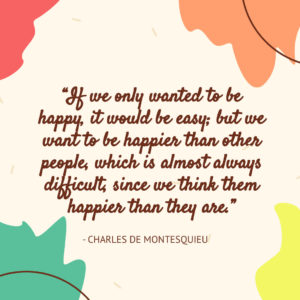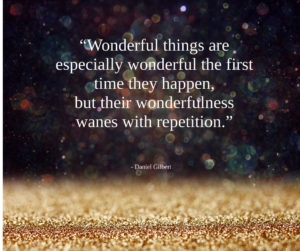Have you ever wondered why the more we tend to have in a materialistic sense, the less fulfilled we are – generally speaking?
Despite decades of economic growth, the population as a whole is slightly less happy. On paper, many have lives that appear awesome, but they’re just not feeling it. Even those with great material and financial affluence are not as psychologically well-off as they could be. Laurie Santos, professor of psychology and teacher of Yale’s most popular class ever, will explore this paradox. She’ll argue that our brains have several dumb features that tend to get in the way of our well-being. On the upside, Santos says there are a series of simple mental hacks that everyone can implement to fight these biases and feel happier.
See her full talk here https://youtu.be/EimJNJXcta4
Read a summary of her talk below.
The idea that when [fill in a future event or circumstance] you’ll be happy and fulfilled has left many people disappointed, searching and striving for what we need to achieve or have next to feel fulfilled. Santos uses Yale college students as a great example. They’ve spent their whole schooling lives, especially their senior year trying to get into this amazing, prestigious college and they finally made it. But why is it when they get there, all the excitement and love of life tends to fade.
Here are some statistics from the National College Health Assessment 2018 (USA).
- 41.9% of college students report being depressed “its difficult to function”
- 53.4% say they feel hopeless
- 62.8% feel very lonely
- 63.4% say they experience “overwhelming anxiety”
- 87.4% say they feel overwhelmed by all they have to do
- 12.1% say they have “seriously considered suicide” in the last year
It doesn’t make sense, these individuals are young, physically healthy students not facing refuge, food or water crisis but they’re still missing something to feel this way (and probably feel the need to read this). David Myers once said “Compared with their grandparents today’s young adults have grown up with much more affluence, slightly less happiness and much greater risk of depression and assorted social pathology.” It seems like once you get to where you want, you are not as happy as you hoped and that providing material ‘leg ups’ or advantages doesn’t necessarily ensure good wellbeing.
Now that raises a question:
Why do so many people after meeting security needs and achieve wealth and privilege still not feel fulfilled?
The problem has to do with our minds. Our mind is filled with several little glitches that make it hard for us to enjoy the things we love. My good friend and mentor Dr David Lake says, “Sometimes your mind is not your best friend. You need to ask if the stories it’s telling you serve you or not”. One of these so-called glitches can be that despite achieving what you thought would make you happy your mind can interfere and prevent you from feeling how you’d hoped you would once you achieved your goal.
It seems like these “mind glitches” are part of the human condition, however understanding how they work can help us live more happy and fulfilled lives. The phenomenon of understanding the mind was turned into a class at Yale and 1 in 4 students in the entire campus were attending the class. This shows that students don’t like the mental health crisis we are in and want to do something about it.
Bottom line- you can’t get rid of the glitches but you can learn to work with them. So here are two glitches of our minds that hinder our ability to enjoy our accomplishments and what you can do to work with them.
1. Our minds get used to things
One reason we aren’t as happy as we would like to be is because we get used to things, we adapt. For example, if you walked into a room with a loud sound it would be annoying but over time you would get used to it – also known as perceptual adaptation. And this is exactly what our minds do, we are so used to our lives we ignore what’s really great – this is known as hedonic adaptation.
We stop noticing the amazing things in our lives once they become a part of it.
“Wonderful things are especially wonderful the first time they happen, but their wonderfulness wanes with repetition.” – Daniel Gilbert
Due to hedonic adaptation we become accustomed to all the awesome things and people in our lives, so we constantly strive for more because we feel we don’t have enough, and this becomes a vicious cycle.
However, if you are aware of what is happening, if you are aware of this hedonic adaptation, you can start doing things to start appreciating the little things more.
Starting an attitude of gratitude is the antidote to the numbing of hedonic adaptation.
Another way to do this is to invest in less materialistic things but things that are harder to adapt to – like experiences. It’s so commonly preached yet so rarely practiced but it truly works. For example, when you buy a new nice car like an Audi it will still be your audi 2 years from now because it’s going to last. But if you spend your money on things that don’t last like a concert or holiday – you are left with a memory and time to savour the experiences.
Take the time to appreciate things that have become a part of your life – car, house, relationships because noticing and appreciating them combats hedonic adaptation. All the research shows that happy people tend to be grateful people so make it an event. Practice gratitude look for the blessings in your life, not only the material things but the people – the people in our life can sometimes go unnoticed. It is extremely powerful to practice this level of gratitude because it reduces hedonic adaptation, hence allowing you to thrive.
2.Our minds seem to care more about context then they do about absolutes
When examining a situation or aspect of life our minds could have the time to look at all the absolutes or maximums in life but they instead take a shortcut and evaluate everything in life, relative to some reference point. Essentially, if you experience something great in life but there’s something out there that’s going slightly better than you, it can hinder that experience and make you feel bad. This emphasizes the power of reference points.
For example – at the olympics there is gold, silver and bronze. The gold athlete is set – there’s no better reference point or anything better so they couldn’t be happier. Silver – not so much, they could only have been 0.1 seconds off the gold, so their reference isn’t every single other person they beat but the one they didn’t. Bronze is content – they were farther off the gold than the silver, they almost didn’t make it on the podium, so their reference is everyone they beat, not the two they didn’t. Bronze medal winners are almost always happier than the silver medal winners, according to research
This shows why we aren’t happy in our lives – you could be doing amazing, have one of the best salaries in your company, but if you’re second best, that stings. It means we aren’t evaluating all the factors in our life but instead doing it relative to some reference point. This is also known as simply putting things into perspective.
“Men do not desire to be rich, but to be richer than other men.” – John Stuart Mill
This concept leads to a problem – every time you see someone doing better than you, you feel bad about yourself or your life. The other problem is that we don’t get to choose what reference points we use, our mind just takes notice of whatever one is usually doing better than us, which can impact our perception on life and ourselves. We can’t control whether we compare ourselves or things to reference points, we can’t even choose what those points are, but what is worse is we usually get the comparisons wrong.

We generally think things are better than they are or people are having more positive experiences than they are so we must learn to not compare to things that we have no real knowledge on and focus on appreciating what we do have and celebrating the wins along the journey. It’s not our fault though, humans tend to hide all the bad things that happen to them. This means that the social comparisons we are getting aren’t just bad for us, they’re incorrect, we are comparing ourselves to standards that aren’t even real.
To fight off these reference points we need to switch things up, introduce variety to notice the good things in our life. This means even if you are the best at something or receiving the best marks, you have to downgrade once in a while to realise how good it is. One technique is negative visualisation – imagine what it would be like to lose all the great things in your life, that then becomes your reference point. If you want to love something – you have to let it go once in a while. It’s not the circumstances in our life that make it bad – it’s our minds perception of it
In summary, our minds don’t do us many favours to say the least. Two aspects of the way the human mind works tend to create upset and suffering. One is hedonic adaptation and the other is reference points. What can help manage these natural tendencies in our minds is to practice gratitude, negative visualisation and appreciation for the material things and people in your life.



